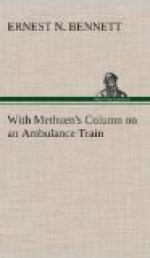I have made no attempt to give a detailed account of the day’s fighting. If I did I should naturally speak of the excellent work done by the Guards on the right, where the Scandinavian contingent was almost annihilated, and, later on in the day, by the Gordons, who left their convoy work on the left and advanced gallantly towards the Boer position. No praise can be too high for our artillery. It was their excellent shooting that helped our men to rally after the first shock, and which ultimately succeeded in driving the Boers from their first line of trenches. These trenches were admirably constructed in long deep parallel lines connected at the ends so that a force could advance or withdraw from any point without being noticed by ourselves. Shell fire could do little against troops so splendidly entrenched. The Boers, like the Turks at Plevna, crept under their epaulements while the shells screamed overhead or swept the parapets with shrapnel bullets, and then, when this tyranny was overpast, crept out and poured in one of the most terrific fusilades of the century’s warfare.
When we returned to Modder River with our carriages ready for a fresh load we found all our troops and guns back again in camp. The trenches, however, were manned, and every one on the alert. The armistice to bury the dead expired on the 13th, and a Boer commando had been sighted to the west. In a brief interval of leisure I took a short stroll, and I noticed how much more plentiful tobacco was now than a month ago when a Mauser rifle was offered for a sixpenny packet of cigarettes. One soldier told me that he had actually paid three shillings for a single cigarette.
We loaded up with 120 fresh cases and steamed off for Capetown. The armoured train was moving fitfully about as we left, but the poor thing’s energies were rather cramped as the line disappeared about 300 yards north of the station.
Just before we crossed the river we saw the two war-balloons floating above the camp, and our cook informed us with a great show of expert knowledge that these balloons were absolutely proof against bullets or even shells, “for,” said he, “if anything hits them it rebounds from them like my fist does from this ’ere pillow”. A rather similar story was told me by a wounded Highlander. He declared that a pal of his had been struck in the stomach by a shell at the Modder River fight. “Oh,” said I, “there wasn’t much of your poor friend left, I suppose?” “He wasn’t much hurt,” was the reply, “though he did spit blood for a few hours.” “Great Scot! what became of the shell?” “Oh,” said my informant, “I didn’t notice, but it must have bounced off Bill’s stomach.” The soldier quite believed that this marvellous incident had occurred. What had happened was probably this: a shell had passed so close to the man that the concussion of the air had “taken his wind” and ruptured some small blood-vessels. I remember at the capture of Malaxa in Crete that three insurgents were hurled to the ground by the air pressure of a Turkish shell which passed within a yard or two of their heads.




